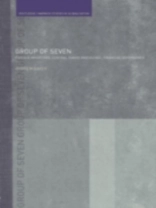We are now in the era of the G8, although the G7 still exists as a grouping for Finance Ministers. Why do G7 finance ministries and central banks co-operate? What are the implications of this co-operation for US power and the abilities of the other six states to exercise leadership? What role do the G7 play in global financial governance? How much authority do they possess and how is that authority exercised? This is the first major monograph on the political economy of G7 finance ministry and central bank co-operation. It argues that to understand the contribution of the G7 to global financial governance it is necessary to locate the process in the context of a wider world financial order comprised of decentralized globalization. It also provides original case study material on the G7’s contribution to macroeconomic governance and to debates on the global financial architecture over the last decade. It assesses the G7’s role in producing a system of global financial governance based on market supremacy and technocratic transgovernmental consensus and articulates normative criticisms of the G7’s exclusivity. For researchers in the fields of IR/IPE generally, postgraduate students in the field of international organization and global governance, policy makers and financial journalists this is the most extensive analysis of the G7 and the political economy of global financial governance to date.
Andrew Baker
Group of Seven [PDF ebook]
Finance Ministries, Central Banks and Global Financial Governance
Group of Seven [PDF ebook]
Finance Ministries, Central Banks and Global Financial Governance
Achetez cet ebook et obtenez-en 1 de plus GRATUITEMENT !
Langue Anglais ● Format PDF ● Pages 312 ● ISBN 9780203001493 ● Maison d’édition Taylor and Francis ● Publié 2005 ● Téléchargeable 6 fois ● Devise EUR ● ID 2283442 ● Protection contre la copie Adobe DRM
Nécessite un lecteur de livre électronique compatible DRM












